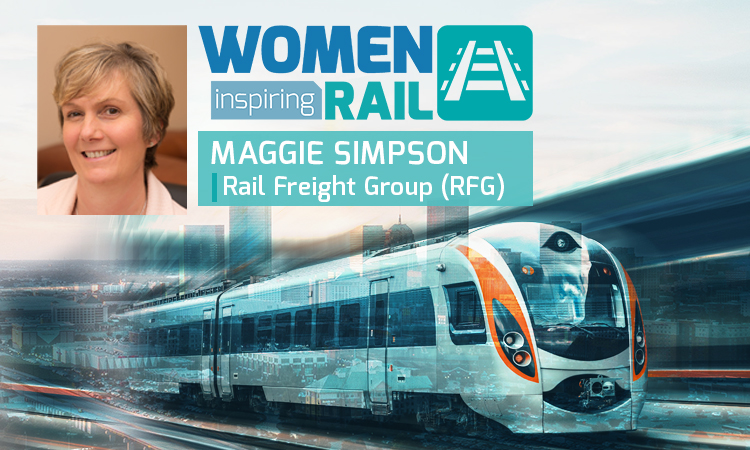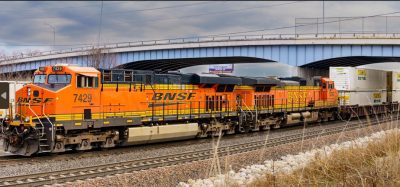Women Inspiring Rail: A Q&A with Maggie Simpson, Rail Freight Group
Posted: 26 June 2019 | Maggie Simpson | No comments yet
For the latest instalment in Global Railway Review’s Women Inspiring Rail series, Maggie Simpson, Director General of the Rail Freight Group, discusses how her hard work helps freight become the narrative of businesses across the UK.

How did your career in rail begin and what does your current job involve?
I was working in safety and risk assessment for a consultancy, and we started to work with railway clients, which gave me a really good introduction to the sector. From there I went to OPRAF, managing franchise contracts, and then to the Strategic Rail Authority in their freight team. I’ve been in freight ever since, moving to the Rail Freight Group in 2005.
In my current role I lead the RFG – in particular its work to influence the growth of rail freight. This means I spend time with opinion formers, politicians, railway bodies and of course the companies who make up our membership, setting out the case for freight. A big part of our work is making sure that railway and Government policy supports our sector. We also do a lot of promotional work, as well as running an extensive events programme.
What aspects of your job do you find the most challenging/rewarding, and why?
The railways are such a fundamental part of the wider business framework in the UK, and when we can help those businesses improve their supply chains it is really rewarding.
Rail freight is a small part of our industry and we have to shout quite loudly to make sure our voices are heard. This can be quite frustrating and challenging – and I am constantly surprised by how little people still know about the freight sector. But it is really rewarding when you feel you have made a difference, and when you hear others talking about freight as part of their narrative.
What is it about the rail industry that you are most passionate about?
Being in rail freight is a real privilege because it has such a wide reach across so many parts of our economy. I get to learn about ports, international trade, shipping, quarrying, construction, steel distribution, retail and a whole host of other areas just by talking to our members. The railways are such a fundamental part of the wider business framework in the UK, and when we can help those businesses improve their supply chains it is really rewarding.
What has been your biggest achievement/proudest moment so far in your rail career?
Rail freight has changed significantly since I first started, and the most influential change has been the customers of the industry becoming far more involved with their freight operators.
That’s a hard one! There have been some quite significant policy changes that we have influenced, particularly around the planning framework, and it is good to see new developments such as the new strategic rail freight interchange at East Midlands Gateway, which opens later in 2019, take advantage of those changes. It’s also great to see the full extent of the railway which is now ‘gauge cleared’ for standard containers as this is something I started working on back in 2001, when no routes at all were capable of this. Today, a significant part of the network is enabled, and most of the major ports have access to at least one gauge cleared route.
How has the rail industry evolved since you joined? What have been the biggest changes?
Rail freight has changed significantly since I first started, and the most influential change has been the customers of the industry becoming far more involved with their freight operators. A significant amount of private money has been invested in ports and terminals, and even wagons, alongside that investment from the freight operators themselves, which stands between £2-3 billion in the last 20 or so years.
We have also seen some important partnerships between freight operators and logistics companies such as Malcolm Logistics, Maritime Transport and several others, which has opened up the retail market to rail. Tesco and Asda cargo boxes being transported when I’m out and about is something I love to see.
Who within the rail community has been an inspiration to you, and why?
We need to make sure that the railways are an attractive place to work for everyone.
Our previous Chair, Lord Berkeley, who retired in 2018 was a real inspiration. He showed me how to make a case, and the importance of persistence. He is unstoppable even now in pursuit of an argument, and although our techniques might differ, it was his advice and support that showed me how best to succeed in my role.
What can be done to diversify the workforce in the rail sector? What advice would you give to those thinking about pursuing a career in rail?
We need to make sure that the railways are an attractive place to work for everyone. There are some amazing projects and programmes out there, and some excellent work in taking this into schools, but people’s perceptions of the industry is still of a sector that is rather old fashioned. So, we need to ‘walk the talk’ too, and modernise the industry to make it appealing. Every study shows that more diverse workplaces function better and are higher performing, so the incentive to get this right is huge.
I have worked part time now for over a decade and everyone that RFG employs is part time too. Greater flexibility in the workplace can be good for everyone, not just women, and I’d like to see more of this becoming the norm.
If you would like to take part in the Women Inspiring Rail series, or would like to nominate a colleague to part, please email: Craig Waters, Editor, Global Railway Review







